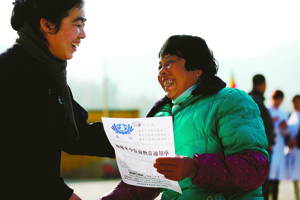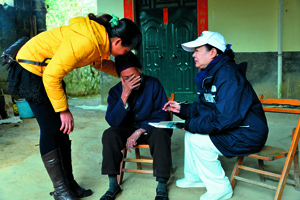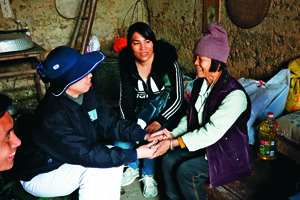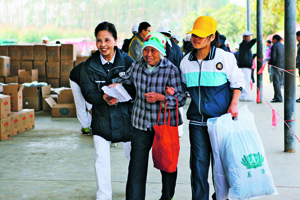

| Winter Aid Distributions in China | ||||||||
| By Zhang Li-yu. Translated by Tang Yau-yang | ||||||||
Delivering Aid, Delivering BlessingsThey were old, poor, and lived alone…but a little smile surfaced on their faces when volunteers put cotton-lined jackets on them. I took my first overseas trip when my husband and I went on a pleasure trip to Europe. It was not until 15 years later—in January 2015—that I left Taiwan again. This time I traveled with a Tzu Chi delegation to Nanning, Guangxi Province, southern China. The main purpose of the visit was to distribute aid to needy families in Wuming District; my chief function was to serve as a documenting volunteer. When we arrived at Nanning, we went to the office of volunteer Mou Rongting (牟容霆), where we met with volunteers from Guangzhou, Shenjun, and elsewhere in Guangdong Province. We all began planning how to make the event as successful as possible.
Visiting homes
We visited the homes of some would-be recipients on January 16, the day before the distribution. Riding in the car, I looked curiously out the window at the scenery as mountain after mountain passed us by.
We came to the town of Xianhu, in Wuming District. After meeting with some local volunteers and village and party officials, our group set out for our home visits. Our first stop was to visit Tang Ping (唐萍), who lived in the village of Sandong. Slogging across muddy ground, we rounded a pond and came to her home. She started crying the moment she saw us. Deng Hanxing (鄧漢興), the village official, told us that her husband had died the previous year and that she had a girl in high school and two sons in elementary school. Her grandmother, 93, also lived with her. The grandmother was boiling some water over a wood fire when we arrived. She wiped away her tears with her wrinkled hands as she told us how little she could do to help the family. Steam rising from the pot permeated the air, seeming to symbolize the clouds overshadowing the family. Tang continued to cry. The sad atmosphere got to us, and some of us felt our noses sting as tears formed in our eyes too. I tried to comfort Tang by saying that her husband would not have wanted to see her so downcast, and I encouraged her to be strong for her kids and to pick herself up. She calmed down a bit and nodded her head, saying that she understood. After we left Tang’s house, we went to the village of Dengji. Zhong Aiping (鍾愛萍) and her mother-in-law were already waiting for us when we arrived. Zhong told us that she had two children, a 19-year-old daughter in college and a six-year-old boy. Her husband had died of liver cancer a couple of years earlier.
As the sole breadwinner in the house, Zhong does odd jobs here and there. It has been very tough for them to make ends meet, but she has come to terms with her lot. “My children are my pride,” Zhong said. “I do all I can to give them a good education. Our whole family pins our hopes on them.” I was moved by her optimism, and I said to her, “These are tough days, but they’ll pass. Hang in there!” The village official informed Zhong that she would speak at the distribution the next morning on behalf of the villagers to thank Tzu Chi for delivering the aid to them. Zhong said bashfully, “I’m a little nervous about such a hefty responsibility.” I gave Zhong a small decoration to wish her and her family blessings before leaving her house. She promptly hung it up on a wall and said cheerfully, “Thanks to Tzu Chi Taiwan.” We drove some more on winding, uneven concrete mountain roads. After crossing a purported 200-year-old bridge and traveling a short while more, we reached the village of Liancai. A few local residents were chatting on the roadside. The village official asked one of them to direct us to the home of Yang Lanfen (楊蘭芬). He could not have asked a better person because she was none other than the one we had come to visit. Everybody had a good laugh at the coincidence. I told Yang the purpose of our visit, and she cheerfully led us to her house, which was not much more than a small room. There was a bed in the stark room, and a small area in a corner served as a kitchen. The single room was all there was to the house, and it was so very small that I felt like crying. But Yang was all smiles, talking loudly and optimistically. “I used to work at a pottery factory, but it shut down long ago. Now my neighbors and I look out for one another. We make do, and we get by all right.” “You’re quite a singer,” the party official said. “Why don’t you sing for us, especially for the Taiwanese visitors?” Yang immediately belted out a song, her voice sonorous and crisp. She even accompanied her singing with some hand gestures like a professional performer. Everyone praised her profusely. I asked her the name of the song. She laughed and said, “Oh, it doesn’t have a name. I just made it up on the spot. The gist of it is to praise the kind people in Taiwan for bringing necessities to us in the mountains, making this an easier and more comfortable winter and giving us happiness.” Our home visits in the mountains took much of the morning. We drove back to Xianhu and visited another needy family there. Huang Hanzhong (黃漢忠) lived with his wife, Nianjun (黃年君), and with his daughter-in-law and grandson. Their son, who worked in Nanning, came home once a month.
Nianjun had had a stroke, leaving her with a weakened left hand. She was gloomy and didn’t say a single word during our visit. Huang told us he had sought out every therapy possible, Chinese or Western, for his wife, but nothing had worked. They could only resign themselves to the situation. Huang thanked the Tzu Chi volunteers for delivering aid to them before the Chinese New Year. He said he had nothing but gratitude in his heart. There is much misery in the world. The upcoming aid distribution would at least give the needy something tangible and useful. We wished all these families the best.
The distribution The sun shone bright and beautiful on January 17, the day of the distribution. Villagers gathered early at Xianhu Central School and waited eagerly for the distribution to start. Local leaders kicked off the day with talks and volunteers led participants in singing, accompanied by hand gestures. The sound of the music touched people’s hearts. I was surprised to see many of the villagers crying. Two groups of people caught my eyes. Some five- and six-year-olds were helping in the packing area. They were the children of some of the teachers at the school. Their little hands busily worked beside the hands of adults. Three little boys said in one voice, “It’s great to help.” The second group consisted of seventh, eighth, and ninth graders working in the waiting and packing areas. They were helping villagers carry their goods to areas where they would wait for vehicles to take them home. One of the students said of their service, “Sure, moving this stuff is a little tiring, but being able to help others makes us happy.” Pan Junwu (潘俊武), a seventh grader, lived with his grandfather while his parents worked in Nanning. Pan used a handcart at the distribution to move things for villagers. It was hard work, and he sweated profusely despite the cold weather. But he still wore a bright smile. “I came here on my own initiative,” he said. “It’s a good thing to help others. It’s hard work, but I just don’t feel it.” I wrote down his every word, impressed by the good-heartedness of the mountain boy.
Pan Meigui (潘美桂), a teacher at the school, and her seventh-grade daughter were on hand to help too. “Giving our own folks a hand brings us joy,” she said. “And my daughter gets to experience the bliss of volunteering. Learning to serve others is a very good thing.” I saw Wen Xingji (文型基), a polio victim, amidst the crowd waiting to receive supplies. He looked a bit forlorn, so I chatted with him. “This is the first time that I’ve ever received help from a charity like yours,” he said shyly. “Thanks to your care, many poor families can have a warmer winter. Not only do you give out relief goods, but you also sing and perform for us and serve us snacks and hot tea. That’s very special.” Chen Caiqian (陳彩千) suffered from dwarfism. She looked at me and smiled. I walked with her to the school entrance to wait for a neighbor to pick up her and her supplies. While waiting, I listened to her story. “My husband passed away six months ago and my only daughter is 15,” she said. “The recent drought resulted in two poor rice harvests in a row, so it’s been tougher for us lately.” Now the two of them would have their first steamed rice in a long time. The other necessities would help them too. Chen had also received a pink scarf. I wrapped it around her for some festive cheer. She reached into her bag and brought out a purple scarf, which volunteers had asked her to give to her daughter as their gift. “She’s going to love it,” she commented. Liang Haiying (梁海英), a radio station reporter, was on the scene to cover the event. She had seen many needy people in Wuming in her six-year career, but this was the first time she had seen such a large distribution. She said she was impressed and would use the power of the media to let more people know about the event and to help create a ripple effect of goodness. The distribution this day benefited 1,156 people in 606 families. Aid items included cotton-lined jackets and cotton underwear, cooking oil, and rice.
More home visits After the distribution, we Tzu Chi volunteers split up into 12 teams to visit the homes of more needy people. Our path was adorned with colorful flowers swaying in the gentle breeze. The blooms looked all the more exuberant under the bright afternoon sun, but despite their beauty, they could not arouse my interest. My mind was ruffled by worry that the families we were about to see would be in as much misery as those that we had visited the day before the distribution. We came to the home of a Mr. Liang in the village of Siyu. Spider webs dominated the underside of his roof eaves, and his kitchen was full of old pots and pans. I tried hard to breathe in fresh air, but a foul, sour smell was all I could inhale. I was overwhelmed by emotions. It was hard for me to imagine that in this day and age, Mr. Liang still lived in a way reminiscent of the life of impoverished families in Taiwan 50 years ago. In fact, the living conditions at the next five households we visited were more or less like Mr. Liang’s. Those houses were also all occupied by old people. They lived alone, some bedridden and very sick, and they were all very poor. There were no refrigerators or TVs. But smiles appeared on the faces of these old people when we put cotton-lined jackets on them and gave them other relief goods. We conducted all the visits on foot. I have no idea how many miles we covered. My heavy backpack made my steps more laborious; my legs ached and felt like solid lead. As I struggled to take the next step, I kept an eye out for cow and chicken droppings in case I might slip on them. Before we ended each visit, we sang a song to convey our blessings. Tears welled in my eyes as I wished the villagers all my best. |

















|




